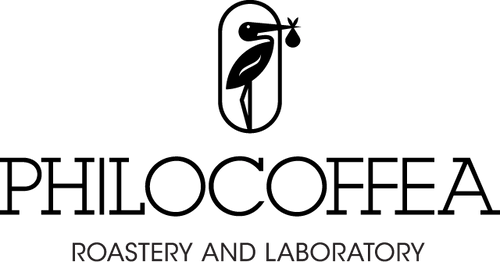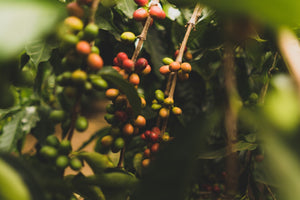Have you ever wondered how our specialty coffee reaches your cup? Read this article to learn how Philocoffea’s supply chain ensures you get the highest quality every time.

Why Good Coffee is So Hard to Find
Many factors contribute to the quality of coffee. When our founder and CEO, Tetsu Kasuya, visits a farm, this is what he looks for.
- Location: One primary reason why coffee connoisseurs care so much about where their coffee comes from is that factors such as climate and soil conditions can significantly affect quality.
- Cultivation: Growing great coffee requires more than just planting trees. The world’s best farmers are meticulous about growing their coffee and have developed processes based on a combination of scientific understanding and personal experience over many years.
- Hand-Picking: While the cultivation of specialty coffee has undoubtedly evolved over the years, hand-picking the beans remains the only way to ensure optimal ripeness. This human touch is a significant factor that differentiates specialty coffee from mass-produced varieties.
- Sustainability: We only have one planet, and we all must work together to protect it. Thus, we only source from farms that are committed to eco-friendly practices.
At Philocoffea, we do not just search for “good beans'' and buy them. We focus on finding the world’s best farms that we can rely upon to uphold these standards. Thus, they provide a long-term source for truly excellent specialty coffee that is the foundation of our business. However, it's impossible to always buy everything directly from the farm, as Philocoffea doesn’t have the system to do so. Thus, we sometimes work with a green beans trading company in between.
What Exactly is Specialty Coffee?

Since we’re headquartered in Japan, we follow the Specialty Coffee Association of Japan (SCAJ)’s definition. Since, as of the time of writing, it’s not available on their English website, we’ll provide a translation below. It’s very well thought out.
[Disclaimer: This is just our best-effort translation — the SCAJ has not endorsed it!]Definition of Specialty Coffee
- Specialty coffees and ordinary coffees are distinguished and classified according to the SCAJ cup evaluation criteria, based on the flavor of the coffee liquid (cup quality). The cup evaluation criteria will be revised as necessary to reflect developments and changes in specialty coffee.
- SCAJ's own strict evaluation standards for green coffee beans are also necessary. Still, at this point, the standards must be consistent with the standards of each producing country, and the SCAA standards for defective beans will be used as a reference. This will be an issue for further study, and revisions will be made as necessary.
- The research theme is the flavor characteristics of coffee that Japanese people find delicious.
- Cleanliness of the Cup Quality: This is the essential starting point for coffee quality. The cleanliness of the cup is the absence of any dirt, flavor defects, or flaws. Clarity is vital for the coffee to express its terroir characteristics clearly. Flavor blemishes and imperfections hide the flavor profile of the terroir, making it difficult for the drinker to detect.
- Sweetness: The perception of sweetness is directly related to the ripeness and uniformity of the coffee cherries when they are harvested. Sweetness is not an absolute quantity of sugar in roasted coffee but depends on the combination of other components and elements that create the impression of sweetness. Also, even if the sugar content is high, the sweetness will be difficult to perceive if factors interfere with the perception of sweetness, such as pungent bitterness, stimulating acidity, strong stains, and astringency.
- Acidity Characterization: How bright the coffee is. The evaluation is based on how bright, fresh, or delicate the acidity is. Good acidity gives the coffee a lively impression, delicacy, and a solid backbone. It is not the strength of the acidity but the quality of the acidity that is evaluated. On the contrary, irritating acidity, acidity that gives an unpleasant impression, acidity without freshness and sharpness, and deteriorated and unpleasant acidity should not be present in specialty coffee.
- Texture in the Mouth: A sense of touch is conveyed by coffee. In-mouth texture includes sensory and tactile perceptions such as stickiness, density, weight, smoothness on the tongue, and astringency. The sense of quantity in the mouth is not the same as texture. If too much attention is paid to the sense of quantity, the tactile sensation of unpleasant roughness can be mistakenly judged as fullness. The quality of texture must be evaluated.
- Flavor Characteristics and Flavor Profile: The most crucial factor that distinguishes specialty coffee from ordinary coffee. A combination of taste and aroma. If cultivation, harvesting, collection, sorting, production processing, storage, roasting, and extraction are carried out ideally, the characteristics of the growing region (terroir) will be correctly expressed.
- Aftertaste Impression: The flavors that persist after the coffee has been swallowed may enhance the pleasantness produced by other attributes of the coffee, they may weaken it, or they may ruin it altogether. Determine if the coffee feeling in the mouth after swallowing the coffee disappears with a sense of sweetness or if it oozes with an irritating and unpleasant sensation.
-
Balance: Does the coffee have an excellent harmony of flavors? Is there anything that sticks out? Is there anything lacking?
Finding Good Farmer

The biggest challenge is finding good farmers involved in the production of coffee and people who can be trusted and whose values match those of Philocoffea. As long as they have the same sincerity and care about bean production, we can naturally get good beans.
Some farmers are particular about the amount of sunlight they get: It's not good to have too much sun, so make sure it's not in direct sunlight. The sun exposure can affect the quality heavily, so some farms manage coffee trees by area based on sunlight exposure and rate beans at different prices.
There is no way to control the regional characteristics. Some are very particular about where they plant, such as elevation. You can't control that. If a tree gets too old, you need to cut it down from the root and regrow it.
Some farmers insist on growing the trees from the seedling stage. It does not mean that it is not a specialty coffee if they do not do all these things.
Tetsu chooses farms to work with based on whether their work is careful, whether they like coffee, or are passionate about coffee.
How we Bring Specialty Coffee to You

Finding and purchasing plain specialty coffee is just a case of hard work on the farmer's end. Philocoffea focuses on roasting specialty-grade coffee and delivering them to the customer in perfect quality.
With quality material like this, It is easy to be overwhelmed by the quality of the ingredients and become just a coffee shop where the ingredients are just specialty coffee.
Philocoffea focuses on adding more value to the already good ingredient. Roasting, grinding, and packaging are all part of the Philocoffea story.
Philocoffea's bean taste is not 100% determined by the green beans but by the roasting. We aim for a clean taste and are conscious of whether or not the aftertaste is clean and whether or not the sweetness is intense.
We are very particular about what kind of unique experience we can offer with our specialty coffee products.
Next Steps
Looking for a new coffee experience? Check out our shop's coffees from Africa section — you're sure to find something amazing!
_____________
Cover photo by Clint McKoy on Unsplash

